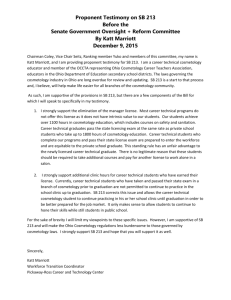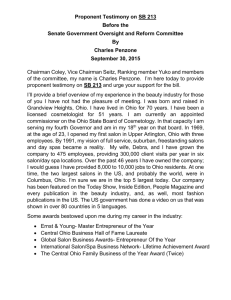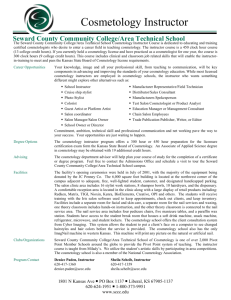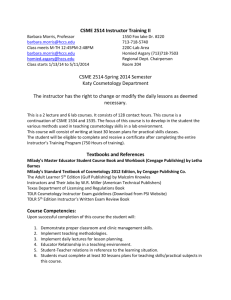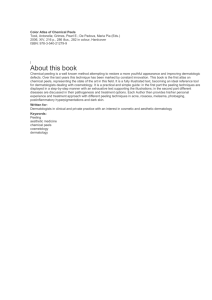Don Yearwood, President – Ohio Association of Cosmetology
advertisement
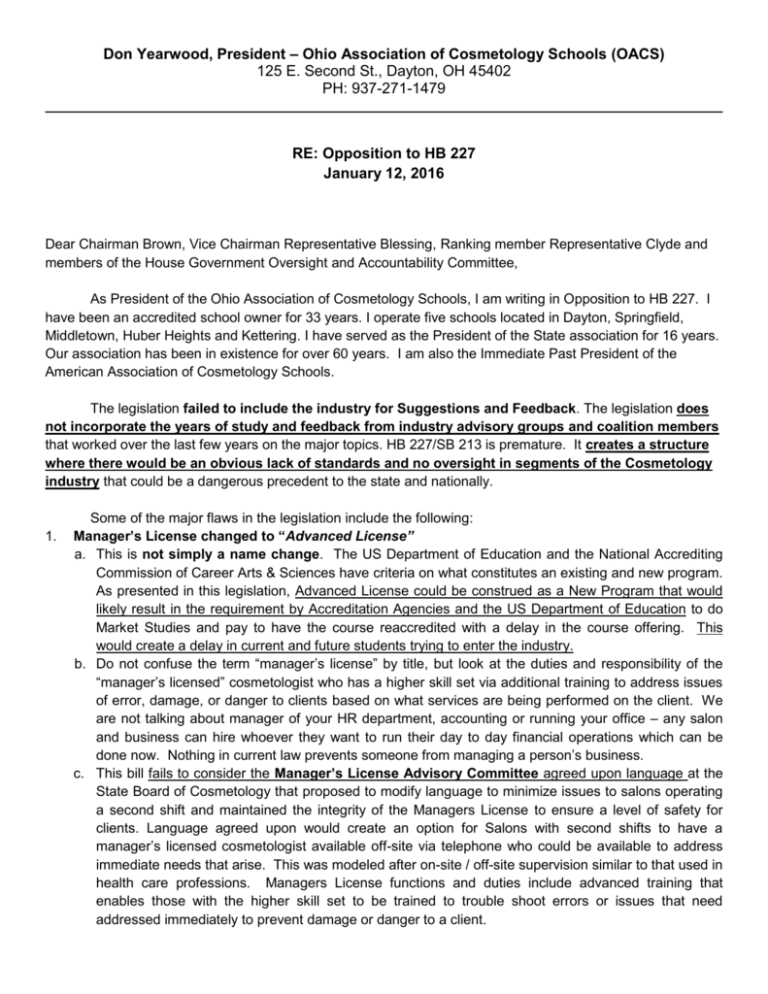
Don Yearwood, President – Ohio Association of Cosmetology Schools (OACS) 125 E. Second St., Dayton, OH 45402 PH: 937-271-1479 RE: Opposition to HB 227 January 12, 2016 Dear Chairman Brown, Vice Chairman Representative Blessing, Ranking member Representative Clyde and members of the House Government Oversight and Accountability Committee, As President of the Ohio Association of Cosmetology Schools, I am writing in Opposition to HB 227. I have been an accredited school owner for 33 years. I operate five schools located in Dayton, Springfield, Middletown, Huber Heights and Kettering. I have served as the President of the State association for 16 years. Our association has been in existence for over 60 years. I am also the Immediate Past President of the American Association of Cosmetology Schools. The legislation failed to include the industry for Suggestions and Feedback. The legislation does not incorporate the years of study and feedback from industry advisory groups and coalition members that worked over the last few years on the major topics. HB 227/SB 213 is premature. It creates a structure where there would be an obvious lack of standards and no oversight in segments of the Cosmetology industry that could be a dangerous precedent to the state and nationally. 1. Some of the major flaws in the legislation include the following: Manager’s License changed to “Advanced License” a. This is not simply a name change. The US Department of Education and the National Accrediting Commission of Career Arts & Sciences have criteria on what constitutes an existing and new program. As presented in this legislation, Advanced License could be construed as a New Program that would likely result in the requirement by Accreditation Agencies and the US Department of Education to do Market Studies and pay to have the course reaccredited with a delay in the course offering. This would create a delay in current and future students trying to enter the industry. b. Do not confuse the term “manager’s license” by title, but look at the duties and responsibility of the “manager’s licensed” cosmetologist who has a higher skill set via additional training to address issues of error, damage, or danger to clients based on what services are being performed on the client. We are not talking about manager of your HR department, accounting or running your office – any salon and business can hire whoever they want to run their day to day financial operations which can be done now. Nothing in current law prevents someone from managing a person’s business. c. This bill fails to consider the Manager’s License Advisory Committee agreed upon language at the State Board of Cosmetology that proposed to modify language to minimize issues to salons operating a second shift and maintained the integrity of the Managers License to ensure a level of safety for clients. Language agreed upon would create an option for Salons with second shifts to have a manager’s licensed cosmetologist available off-site via telephone who could be available to address immediate needs that arise. This was modeled after on-site / off-site supervision similar to that used in health care professions. Managers License functions and duties include advanced training that enables those with the higher skill set to be trained to trouble shoot errors or issues that need addressed immediately to prevent damage or danger to a client. d. The Legislation calls for 6-month Apprenticeship to work unsupervised (Does not apply to Boutique Services). (Line 1756) This provision creates an inequity between Boutique Service providers and regular licensees. Some Salons have non-compete clauses for their employees. If all cosmetologists were required to complete an apprenticeship before working on their own, many cosmetologists would lose the opportunity to become their own small business owner, or become an independent contractor cosmetologist who can work solo after obtaining their Manager’s License Cosmetology schooling. The largest segment growing in this industry are individuals who want to have their own clients, set their own hours of work and become small business owners in charge of their own destiny and careers. The unintended consequences of forcing this segment of the population to go work in an apprenticeship under salons which mostly have non-compete agreements is a major barrier and hindrance to young promising careers and businesses. This legislation empowers large salons and moves toward creating a monopoly type environment for larger salons by putting up barriers to competition by new small mom & pop and independent cosmetologist entrants to the Cosmetology Industry. e. The legislation makes all disciplines within the various services of cosmetology the same number of hours – 100 Hours. Curriculum for all disciplines is significantly different although the test is the same for all disciplines. f. 100 Hours (Advanced) for the Cosmetology Program is barely over 2 weeks for a Full-Time Student. It would be practically impossible to put together a 3 discipline class, covering the multiple topics for such a limited time period. Thereby, making the program unteachable. This could have a major impact on an Independent Contractor (I/C) being able to obtain I/C licensure. Many of these Independent Contractors are small businesses and which have seen significant growth over the years. g. Myth that 300 hours for “manager’s license” is burden to students. 300 hours equates to about $380 dollars at some schools for the manager’s license add-on program providing the additional training which enables students upon graduation to become sole proprietors, or to open their own business enabling them to set their own hours, set their own prices, set their own goals. These newly graduated and current manager’s licensed cosmetologists can choose to open a business and work when they have clients scheduled enabling them to work, earn a living, take their kids to school in the morning, pick their kids up after school, set their own hours based on their career dreams. The dream of being your own boss. Not everyone fits into the big salon business model. Empowering students to choose the career and job of dreams. Creating small businesses which are the backbone of Ohio is a positive which the manager’s license cosmetology program is all about. Don’t set an industry backwards by taking away their opportunities. 2. Addition of Boutique Services a. The Legislation basically creates a setting in which there would be little to no oversight of segments of the Cosmetology and Esthetics license. b. It takes away the authority of the Ohio Legislature regarding determination of services and gives the authority to the Board (Line 440). Very concerning that the State Legislature would give their powers to a Board or Commission without input. c. The Legislation allows for Registration with no education. No Licensure may have state and national implications in which small business servicers may be unable to obtain professional liability insurance thereby putting their clients at risk. Some insurance companies who provide insurance in the industry may no longer offer coverage. The Legislation may not even require for the registrant to be tested on the approval. In the absence of a clear framework of licensing and educational requirements, insurers have indicated they will be less inclined to extend coverage in Ohio. 3. Instructors Examination a. The Legislation has no provision for Work Permit in the school until the exam is taken. All other disciplines allow this provision. This was discussed at the board level as well and the consensus was to allow for a 6-month window to prevent a burden on hiring instructors. b. Standards by the Department of Education and approved by the Board (Line 1659) i. What are these standards? There are no defined standards noted. ii. Ohio has tremendous pass rates. There appears to be no indication or necessity for this type of change. 4. Reports to the Governor (Line 813) a. The Legislation creates new reporting requirements on areas including types of public and private schools, costs to attend public and private schools, loan default rates, pass rates, numbers on new and renewals and more. Does this fall within the scope of the State Board of Cosmetology? The language seems targeted, very intrusive and levied toward private schools. However, there is very little reporting required by Salons. 5. Board may delegate any of the duties listed… to the Executive Director or an individual designated by the Executive Director. (Line 804) a. This is very concerning. It does not define the purpose of the delegation or the qualification of the individuals designated with the duties. In closing, there are many areas in the legislation that will have unintended consequences to a thriving and growing industry. There are few industries that touch so many people daily, weekly, monthly. We are talking about clients who trust in the level of skills including safety, sanitation and Cosmetology subfields that when clients go to a Cosmetologist who is a schooled and licensed graduate in the profession of Cosmetology who will be working with hair, skin tissue, chemicals, instruments close to the skin, eyes, nose, mouth and more, that those Cosmetologists are properly trained and licensed. Our association is OPPOSED to HB 227. I would be happy to meet with you to discuss the legislation. Respectfully, Ohio Association of Cosmetology Schools Don Yearwood President January 12, 2016 To: Representative Brown From: Don Yearwood Ohio Association of Cosmetology Schools 937-271-1479 dfy1214@aol.com REF: Comments based on a recent Interested Party Meeting NECESSITY OF A MANAGER IN SALONS In an effort to reduce the operational burden regarding the “Necessity of a Manager in Salons” we could agree to remove this requirement. The removal of the requirement would give the salons the option of hiring a Managing Cosmetologist to manage the salon or another qualified individual of their choice. We still believe the enhanced skill set of the Managing Cosmetologist to be important but removing the necessity will allow the salons options from an operational standpoint. MAINTAIN OPTIONS FOR BASIC COSMETOLOGY AND MANAGING COSMETOLOGY We believe in providing students, schools, and licensees options with regard to selection of a Basic Cosmetology License at 1500 Clock Hours or a Managing Cosmetology License at 1800 Clock hours (1500 + 300 clock hrs.). Maintaining this option would not require any restructuring of the existing statutory language (ORC 4713) regarding the 300 hour Managing Cosmetology License. We would not support an unteachable 100 Hour “One size fits all” approach for an advanced license in all disciplines. This is not a reasonable concept. CONTINUE WITH THE TERM MANAGER LICENSE I concur with Steve Thompson, Independent Contractor representative on the Ohio State Board of Cosmetology, the term manager, as opposed to advanced, is the much preferred designation. INSTRUCTOR TESTING Current Cosmetology Instructor License requirements can be found within ORC 4713.31 Prerequisite: managing Cosmetology License and 2000 hours certified working experience in a salon or 1000 hours of board approved cosmetology instructor training as an apprentice instructor We believe that the current requirements for Instructors licensure are satisfactory for schools to select qualified educators. However, we are not opposed to an Instructors Examination with the provision that an individual be allowed to work under a Work Permit for 6 months until the examination is passed. This provision is already in place with the other licenses. The development of the examination by the board would create a structure for reference materials and study curriculum for test preparedness. Other than the examination, We would not support any additional requirements or standards for Instructors… we do not believe that with the strong State Board pass rates there is a compelling reason to increase standards at all. The creation of any unnecessary standards or requirements would only create a financial and time constraint burden on the licensees wishing to become instructors/educators. In addition, Accredited Cosmetology School Instructors are currently required to achieve 12 hours of Continuing Education each year in Teaching Methodology and related subjects. ANNUAL REPORTING TO THE GOVERNOR’S OFFICE We oppose the language… “Submits to the board on an annual basis the same reporting information required by the school’s national accrediting body or the United States department of education.” We believe this is overreaching and would create an unnecessary burden on the schools. Some of the information is proprietary and would be intrusive in nature. Again, we oppose this information. LICENSURE OR REGISTRATION OF BRAIDERS AND THREADERS We still believe that based on the exhaustive research done by the board through advisory groups the licensure at 150 hours is the appropriate action going forward for Braiding and Threading. However, we would consider a reasonable approach that is more than simple registration. Possibly, an on-line course at the Board level could be considered for the protection of the public. Ohio Association of Cosmetology Schools Don Yearwood President dfy1214@aol.com

